
The Eucharist, also called Holy Communion, the Blessed Sacrament or the Lord's Supper, is a Christian rite, considered a sacrament in most churches and an ordinance in others. Christians believe that the rite was instituted by Jesus at the Last Supper, the night before his crucifixion, giving his disciples bread and wine. Passages in the New Testament state that he commanded them to "do this in memory of me" while referring to the bread as "my body" and the cup of wine as "the blood of my covenant, which is poured out for many". According to the synoptic Gospels this was at a Passover meal.

The liturgical year, also called the church year, Christian year, ecclesiastical calendar, or kalendar, consists of the cycle of liturgical days and seasons that determines when feast days, including celebrations of saints, are to be observed, and which portions of scripture are to be read.
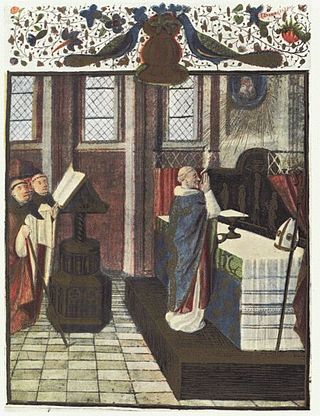
Mass is the main Eucharistic liturgical service in many forms of Western Christianity. The term Mass is commonly used in the Catholic Church, Western Rite Orthodoxy, Old Catholicism, and Independent Catholicism. The term is also used in many Lutheran churches, as well as in some Anglican churches, and on rare occasion by other Protestant churches.

Advent is a season observed in most Christian denominations as a time of waiting and preparation for both the celebration of Jesus's birth at Christmas and the return of Christ at the Second Coming. It begins on the fourth Sunday before Christmas, often referred to as Advent Sunday. Advent is the beginning of the liturgical year in Western Christianity. The name comes from Latin adventus, translating the Greek parousia from the New Testament, originally referring to the Second Coming.

Holy Week includes the events of Jesus Christ's entry into Jerusalem, the last supper, the arrest, and his death by crucifixion. For all Christian traditions, it is a moveable observance. In Eastern Christianity, which also calls it Great Week, it is the week following Great Lent and Lazarus Saturday, starting on the evening of Palm Sunday and concluding on the evening of Great Saturday. In Western Christianity, Holy Week is the sixth and last week of Lent, beginning with Palm Sunday and concluding on Holy Saturday.

In the practice of Christianity, canonical hours mark the divisions of the day in terms of fixed times of prayer at regular intervals. A book of hours, chiefly a breviary, normally contains a version of, or selection from, such prayers.

Confession, in many religions, is the acknowledgment of sinful thoughts and actions. This may occur directly to a deity or to fellow people.

Penance is any act or a set of actions done out of repentance for sins committed, as well as an alternate name for the Catholic, Lutheran, Eastern Orthodox, and Oriental Orthodox sacrament of Reconciliation or Confession. It also plays a part in confession among Anglicans and Methodists, in which it is a rite, as well as among other Protestants.
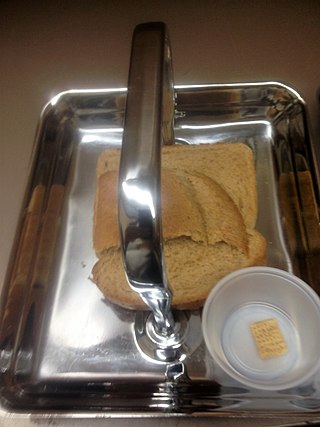
In the Church of Jesus Christ of Latter-day Saints, the Holy Sacrament of the Lord's Supper, most often simply referred to as the sacrament, is the ordinance in which participants eat bread and drink water in remembrance of the body and blood of Jesus Christ. Normally, the sacrament is provided every Sunday as part of the sacrament meeting, the primary weekly worship service, in each LDS Church congregation.

Making the sign of the cross, also known as blessing oneself or crossing oneself, is a ritual blessing made by members of some branches of Christianity. This blessing is made by the tracing of an upright cross or Greek cross across the body with the right hand, often accompanied by spoken or mental recitation of the Trinitarian formula: "In the name of the Father, and of the Son, and of the Holy Spirit. Amen."
Religions with the belief in a final judgment, a resurrection of the dead or an intermediate state often offer prayers on behalf of the dead to God.

Sacrament meeting is the primary weekly Sunday worship service in the Church of Jesus Christ of Latter-day Saints.
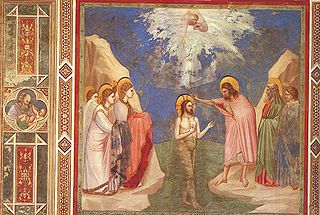
The Feast of the Baptism of the Lord, or Theophany, is the feast day commemorating the baptism of Jesus in the Jordan River by John the Baptist. Originally the baptism of Christ was celebrated on Epiphany, which commemorates the coming of the Magi, the baptism of Christ, and the wedding at Cana. Over time in the West, however, the celebration of the baptism of the Lord came to be commemorated as a distinct feast from Epiphany. It is celebrated in the Catholic Church as well as the Anglican and Lutheran Churches on the first Sunday following The Epiphany of Our Lord. Some Lutheran churches celebrate it on the Sunday before Lent, or Quinquagesima.
Christian liturgy is a pattern for worship used by a Christian congregation or denomination on a regular basis. The term liturgy comes from Greek and means "public work". Within Christianity, liturgies descending from the same region, denomination, or culture are described as ritual families.
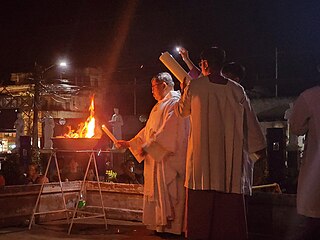
The Easter Vigil, also called the Paschal Vigil, the Great Vigil of Easter, or Holy Saturday at the Easter Vigil on the Holy Night of Easter is a liturgy held in traditional Christian churches as the first official celebration of the Resurrection of Jesus. Historically, it is during this liturgy that people are baptized and that adult catechumens are received into full communion with the Church. It is held in the hours of darkness between sunset on Holy Saturday and sunrise on Easter Day – most commonly in the evening of Holy Saturday or midnight – and is the first celebration of Easter, days traditionally being considered to begin at sunset.

The Friday fast is a Christian practice of variously abstaining from meat, dairy products and alcohol, on Fridays, or holding a fast on Fridays, that is found most frequently in the Eastern Orthodox, Oriental Orthodox, Catholic, Lutheran, Anglican and Methodist traditions. The Teaching of the Twelve Apostles, written in the first century A.D., directed Christians to fast on both Wednesdays and Fridays. The Wednesday fast is done in remembrance of the story of the betrayal of Christ by Judas on Spy Wednesday, while the Friday fast is done in commemoration of the crucifixion of Jesus Christ on Good Friday. As such, all Fridays of the year have been historically kept in many parts of Christendom as a day of strict fasting and abstinence from alcohol, meat and lacticinia. Abstinence from meat on Fridays is done as a sacrifice by many Christians because they believe that on Good Friday, Jesus sacrificed his flesh for humanity. In the Eastern Orthodox Church, in addition to fasting from food until sundown, the faithful are enjoined to abstain from sexual relations on Fridays as well.
The Divine Service is a title given to the Eucharistic liturgy as used in the various Lutheran churches. It has its roots in the Pre-Tridentine Mass as revised by Martin Luther in his Formula missae of 1523 and his Deutsche Messe of 1526. It was further developed through the Kirchenordnungen of the sixteenth and seventeenth centuries that followed in Luther's tradition.
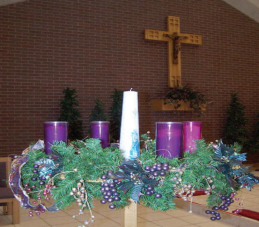
Advent Sunday, also called the First Sunday of Advent or First Advent Sunday, is the first day of the liturgical year in the Western Christian Churches and the start of the Christian season of Advent; a time of preparation for the celebration of Christ's birth at Christmas and the return of Christ at the Second Coming. Advent Sunday is the fourth Sunday before Christmas.

The Lutheran Church in Great Britain (LCiGB) is a small Protestant Christian church in the United Kingdom. The LCiGB is a member church of the Lutheran World Federation and of The Lutheran Council of Great Britain, the umbrella organisation for several Lutheran churches in Great Britain, many of which are chaplaincies or congregations that are closely related to Lutheran churches in other countries. The LCiGB is also a member of the Porvoo Communion of Anglican and Lutheran churches in Europe. It is, in common with many Lutheran churches, led by a bishop and a council of lay members and clergy elected at its annual synod. Tor Berger Jørgensen, former bishop of the Diocese of Sør-Hålogaland in the Church of Norway, was received as the fourth bishop of the LCiGB on 6 October 2019.















